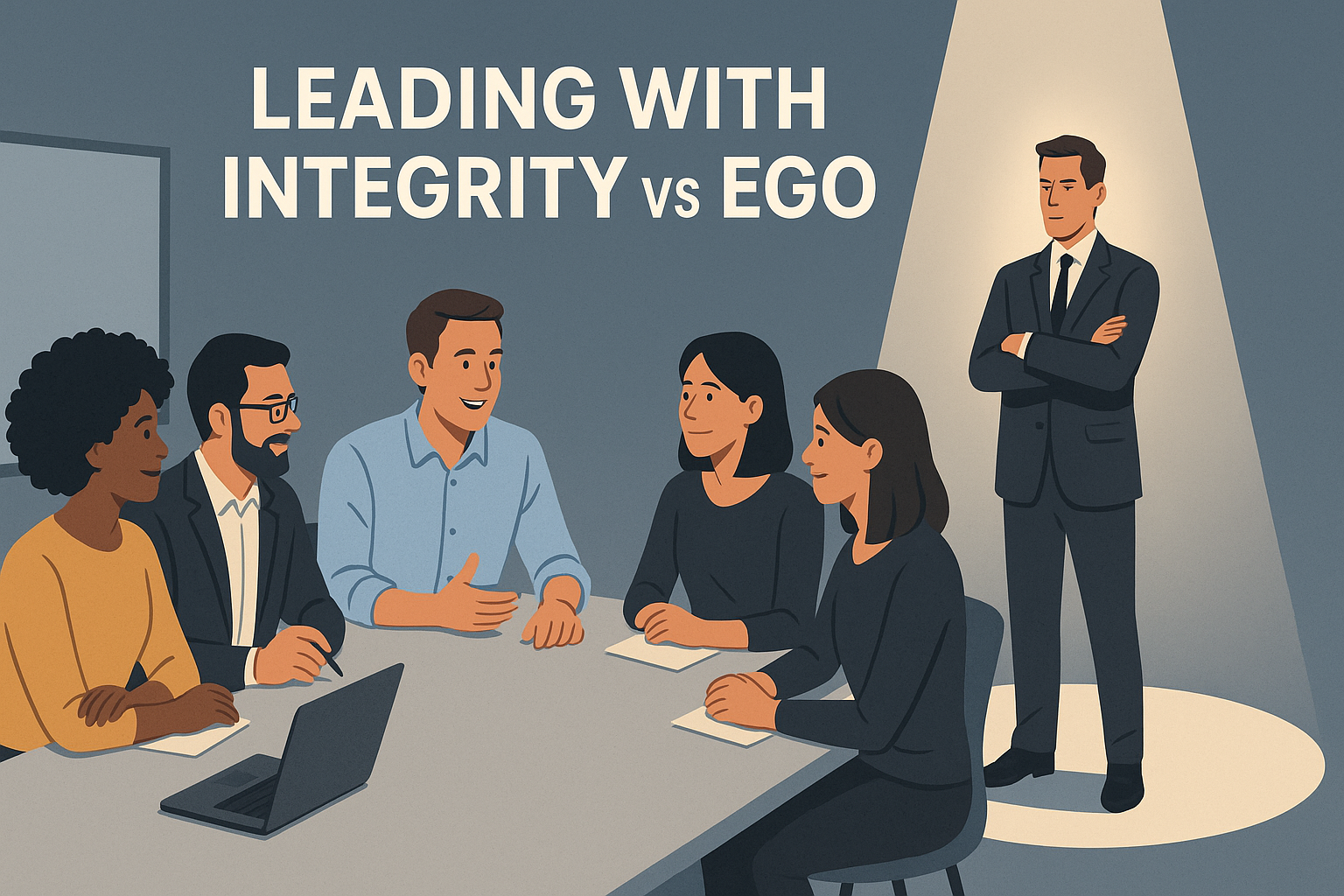In today’s business environment, how a leader leads—whether through integrity or ego—can make the difference between a thriving workplace and a toxic one. When leaders operate with integrity, they inspire trust, collaboration, and sustainable success. When they lead from ego, they may see short-term results, but often at the cost of culture, innovation, and long-term performance.
This article explores these two contrasting leadership styles, how each affects workplace culture and success, and offers practical takeaways for leaders and organizations.
What We Mean by “Leading with Integrity” and “Leading through Ego”
Leading with integrity involves authenticity, ethical behavior, accountability, and putting the team or organization’s purpose before personal gain. It’s about aligning words and actions, building trust, and working collaboratively toward common goals.
Leading through ego, on the other hand, often centers on self-importance, dominance, personal recognition, and status. Decisions are driven by how the leader is perceived, rather than what’s best for the team or organization.
The Impacts on Workplace Culture and Success
Integrity-Based Leadership
- Builds trust: When leaders act consistently with their values and follow through, employees feel safe to speak up, offer ideas, and engage.
- Fosters collaboration and empowerment: Leaders who emphasize “we” over “I,” who share credit, and who listen and learn create more engaged teams. Research shows that teams led by self-aware, humble leaders are 21% more productive and 22% more profitable.
- Enhances long-term success: Integrity supports sustainable performance because it fosters a positive culture, lowers turnover, improves innovation, and attracts talent.
- Enables adaptability: Organizations led with integrity are more likely to listen, adapt, incorporate diverse voices, and evolve.
Ego-Driven Leadership
- Undermines trust: When credit is hoarded, blame shifted, and feedback ignored, trust erodes. Common outcomes include poor decision-making and lack of accountability.
- Creates a toxic culture: Ego-centric leadership often fosters fear, competition rather than cooperation, micromanagement, and high turnover.
- Limits innovation and growth: When leaders believe they have all the answers or suppress dissenting voices, organizations lose out on fresh ideas and agility.
- Risks long-term performance: Ego may deliver short-term wins, but over time it erodes culture, damages reputation, and hinders sustainable results.
Why It Matters: The Business Case
- Culture is a competitive advantage: Leadership style directly shapes culture, engagement, innovation, and performance.
- Talent attraction and retention: Today’s workforce—especially younger generations—values authenticity and ethics. Ego-driven leadership is increasingly out of step with expectations.
- Risk mitigation: Integrity in leadership reduces the risk of unethical behavior, reputational damage, disengagement, and attrition.
How to Foster Integrity-Led Leadership
Here are practical steps for organizations and leaders alike:
- Cultivate self-awareness: Reflect on motives, solicit honest feedback, and recognize when ego drives behavior.
- Embed values and ethics: Make integrity part of hiring, performance reviews, and leadership modeling.
- Shift from “I” to “we”: Celebrate team wins and make shared success visible and valued.
- Encourage open communication: Create safe spaces for feedback and dissenting ideas. Ego-driven cultures often silence these voices.
- Model accountability: Take responsibility for failures, demonstrate learning, and show adaptability.
- Align rewards and recognition: Reward teamwork, humility, and value creation—not personal showmanship.
- Develop emotional intelligence: Research shows emotional intelligence strongly correlates with ethical and effective leadership.
Leadership driven by integrity fosters trust, collaboration, innovation, and sustainable success. Leadership driven by ego may produce short-term wins but erodes culture, limits growth, and increases risk. The choice of leadership style fundamentally shapes workplace culture—and long-term outcomes.
Frequently Asked Questions (FAQ)
Q: Can a leader have some ego and still be effective?
A: Yes. Confidence and ambition aren’t inherently bad. But when ego overrides humility, listening, and ethics, it becomes counterproductive. The best leaders balance confidence with integrity.
Q: How do we measure “integrity” in leadership?
A: Leadership integrity means alignment between values, words, and actions; consistency across situations; transparency; and accountability.
Q: What are warning signs of ego-driven leadership?
A: Constant credit-taking, lack of delegation, ignoring feedback, blame-shifting, low psychological safety, and high turnover.
Q: Can ego ever be positive?
A: Ego can drive ambition and assertiveness, but when unchecked, it undermines trust and collaboration. The goal isn’t to eliminate ego—it’s to manage it.
Q: How fast can a company shift from ego-driven to integrity-led culture?
A: It depends on size, leadership commitment, and systems change. Culture transformation can begin within months and typically accelerates over one to two years.
Leadership style matters. A leader who prioritizes their team, aligns behavior with values, and fosters an open, inclusive culture is far more likely to drive lasting success. Conversely, ego-centered leadership may yield quick wins but comes with long-term cultural and reputational costs.
For modern organizations striving to attract talent, stay innovative, and maintain trust, integrity-led leadership isn’t optional—it’s essential.

